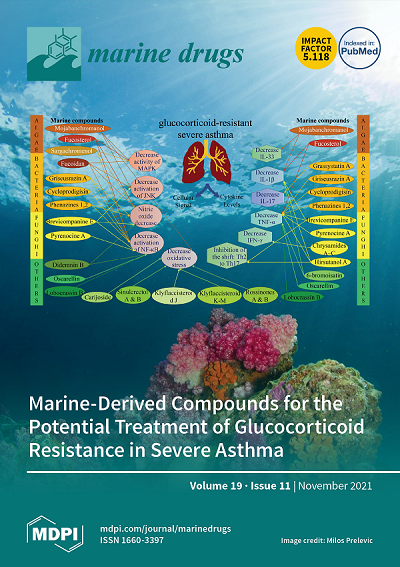从裙带菜中提取的富含谷氨酸-丙氨酸的糖蛋白:一种前景看好的天然抗炎剂
IF 4.9
2区 医学
Q1 CHEMISTRY, MEDICINAL
引用次数: 0
摘要
本研究旨在评估从裙带菜中提取的富含谷氨酸-丙氨酸的生物活性糖蛋白(GP)的抗炎特性。本研究探讨了 GP 对 LPS 刺激的 RAW264.7 细胞、腹腔巨噬细胞以及角叉菜胶和二甲苯诱导的炎症小鼠模型的影响,并研究了其潜在的分子机制。在体外和体内环境中,研究发现 GP 可降低诱导型一氧化氮合酶(iNOS)和环氧化酶-2(COX-2)的表达,同时还能抑制一氧化氮(NO)和前列腺素 E2(PGE2)在脂多糖(LPS)刺激下的生成。通过阻断 IKKα 和 IκBα 的磷酸化,GP 可明显阻碍活化 B 细胞核因子卡巴轻链-增强子(NF-κB)通路的核转位,从而减少肿瘤坏死因子-α(TNF-α)、白细胞介素-1β(IL-1β)和白细胞介素-6(IL-6)等促炎细胞因子。此外,GP 还能有效抑制丝裂原活化蛋白激酶(MAPKs)的活化,p38 和 ERK 的特异性抑制剂能增强 GP 的抗炎功效。值得注意的是,以 10 毫克/千克/天(口服)的剂量服用 GP,可通过阻止炎症细胞向目标组织的浸润,显著减轻角叉菜胶诱导的爪炎和二甲苯诱导的耳水肿。GP 治疗还通过抑制 p38 和细胞外信号调节激酶(ERK)的磷酸化,下调关键炎症标志物,包括 iNOS、COX-2、IκBα 和 NF-κB,从而改善卡拉胶和二甲苯诱导的小鼠模型的炎症指数。这些研究结果表明,海洋资源,尤其是羽扇豆等海藻类,可以作为天然抗炎蛋白的宝贵来源,用于有效治疗炎症及相关疾病。本文章由计算机程序翻译,如有差异,请以英文原文为准。
Glutamic-Alanine Rich Glycoprotein from Undaria pinnatifida: A Promising Natural Anti-Inflammatory Agent
This study aimed to assess the anti-inflammatory properties of a bioactive glutamic-alanine rich glycoprotein (GP) derived from Undaria pinnatifida. This research explored the effects of GP on both LPS-stimulated RAW264.7 cells, peritoneal macrophages, and mouse models of carrageenan- and xylene-induced inflammation, investigating the underlying molecular mechanisms. In both in-vitro and in-vivo settings, GP was found to reduce the expression of inducible nitric oxide synthase (iNOS) and cyclooxygenase-2 (COX-2) while also inhibiting the production of nitric oxide (NO) and prostaglandin E2 (PGE2) in response to lipopolysaccharide (LPS) stimulation. GP treatment significantly impeded the nuclear translocation of the nuclear factor kappa-light-chain-enhancer of activated B cells (NF-κB) pathway by blocking the phosphorylation of IKKα and IκBα, leading to a reduction in proinflammatory cytokines such as tumor necrosis factor-α (TNF-α), interleukin-1β (IL-1β), and interleukin-6 (IL-6). Additionally, GP effectively inhibited the activation of mitogen-activated protein kinases (MAPKs), with specific inhibitors of p38 and ERK enhancing GP’s anti-inflammatory efficacy. Notably, GP administration at 10 mg/kg/day (p.o.) markedly reduced carrageenan-induced paw inflammation and xylene-induced ear edema by preventing the infiltration of inflammatory cells into targeted tissues. GP treatment also downregulated key inflammatory markers, including iNOS, COX-2, IκBα, and NF-κB, by suppressing the phosphorylation of p38 and extra-cellular signal regulated kinase (ERK), thereby improving the inflammatory index in both carrageenan- and xylene-induced mouse models. These findings suggest that marine resources, particularly seaweeds like U. pinnatifida, could serve as valuable sources of natural anti-inflammatory proteins for the effective treatment of inflammation and related conditions.
求助全文
通过发布文献求助,成功后即可免费获取论文全文。
去求助
来源期刊

Marine Drugs
医学-医药化学
CiteScore
9.60
自引率
14.80%
发文量
671
审稿时长
1 months
期刊介绍:
Marine Drugs (ISSN 1660-3397) publishes reviews, regular research papers and short notes on the research, development and production of drugs from the sea. Our aim is to encourage scientists to publish their experimental and theoretical research in as much detail as possible, particularly synthetic procedures and characterization information for bioactive compounds. There is no restriction on the length of the experimental section.
 求助内容:
求助内容: 应助结果提醒方式:
应助结果提醒方式:


